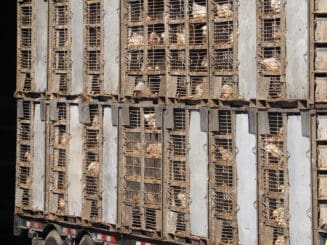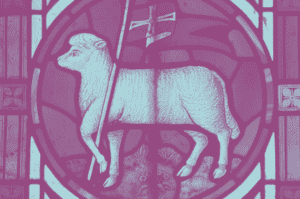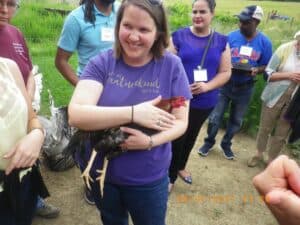
The trees around the slaughterhouse are filled with a fatal lullaby because the mockingbirds have learned this funeral dirge of the young.
Peep. Peep. Peep.
That’s what haunts me most—even more than the puddles of blood and the truck brimming with the “waste” parts of bodies. It is that song coming down from the trees on this city block.
Peep. Peep. Peep.
The mockingbirds taking up the lyrics of chicks now dead. That’s what haunts me most from the morning I recently spent outside Koch Foods’ Chattanooga chicken slaughterhouse.
Peep. Peep. Peep.
The sound evokes fluffy, yellow chicks, nestled under mama’s wing, on a spring morning filled with sunshine. But, that’s not what the song means here.
Peep. Peep. Peep.
The original dirge is sung by those who are the descendants of the red junglefowl—birds who fly into the branches of Asian forests to roost at night and who greet the rising sun with a proud cock-a-doodle-doo. Scientifically, these animals I hear on this Tennessee street may be classified as the same species as their free relatives on the other side of the world, but it is hard to imagine anything further from the truth when you look at the broken, dirty bodies coming into this place.
The birds, just babies, are killed before they reach adulthood.
Peep. Peep. Peep.
They peep on their way to die. They peep on the trucks that bring them into the city from factory farmed lives in windowless sheds. They peep in the crowded cages on the backs of those trucks that are open to the weather—scorching heat, freezing cold, rain, ice, wind, snow—depending on the day they go to die as the trucks hurl down the interstate.
They peep as the forklift takes their cage from the back of the truck and lifts it into the slaughterhouse machinery, the machinery that will rob them not just of their lives, but also of their individuality, their creature-ness. The machinery that will turn each individual animal into just another consumable in the system that is industrial agriculture.
They peep as they ride the conveyor belt into the “processing plant,” disappearing from our view and disappearing from this life.
As I look at a snowy feather settled on the street by my shoe, I see the humans—masked and bloody—who are caught in this machinery. The ones I see are directing trucks laden with still-living birds into the slaughterhouse apparatus. I think about those people who are forced to do this killing work all day long, because of capitalism and classism. I think about the pecking order of my own species and how those who are at the bottom are sent to do this murdering for the rest of us.
I remember the young homeless woman who I drove to a meeting about job placement. She was told that because of her legal background, the chicken slaughterhouse would be the only guaranteed job they could promise her. She was vegan. She told the woman who offered her the job that she just couldn’t do that work. “You’ll do it if you get hungry enough,” the woman replied.
What have we made of this world that both the humans and the non-humans suffer so much under the hands of the powerful—their lives only something to be used up and consumed for profit?
I listen again to the song of the mockingbirds, reciting the words of their sisters, the chickens, now dead. Perhaps this is not a lullaby. Perhaps this is not even a dirge. Perhaps it is the birds calling us to repentance as they are moved toward their own deaths.
This is not the world our God dreamed of us co-creating together—the divine, the human and the non-human. Perhaps the chicks’ song is that call to repentance. That reminder that our Creator is their Creator.
“…you who kill the prophets and stone those sent to you, how often I have longed to gather your children together, as a hen gathers her chicks under her wings…”
Beth Foster is co-director of the Mercy Junction Justice & Peace Center in Chattanooga, Tennessee. Mercy Junction is an interfaith community of artists, activists, and people of faith, rooted in justice, hospitality and peacemaking, to express love for all creation by providing a sacred framework for social justice in the Southeast. Beth and other Chattanooga activists recently joined Nashville Animal Save for a morning bearing witness outside the Koch Foods’ Chattanooga chicken slaughterhouse.



One Response
Beth, thank you for this piece of writing even though reading it was painful. Thank you for bearing witness and reminding us how vital it is to do so.